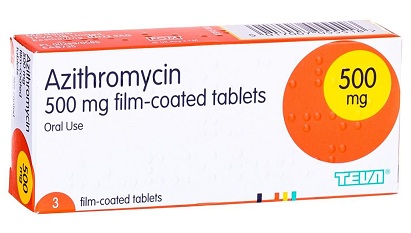COVID-19 Drugs: Study Shows Azithromycin For Certain COVID-19 Protocols Increases Risks For Cardiac Events If Used With QT-Prolonging Drugs
Source: COVID-19 Drugs Sep 17, 2020 5 years, 4 months, 2 weeks, 2 days, 12 hours, 36 minutes ago
COVID-19 Drugs: Azithromycin, a commonly-prescribed antibiotic that also is being investigated as a potential treatment for COVID-19 according to a new study by researchers from the University of Illinois Chicago, by itself is not associated with an increase in cardiac events; however, if taken with certain other drugs that affect the electrical functioning of the heart, then cardiac events increased.

The study findings are published in the journal: JAMA Network Open, a Journal of The American Medical Association.
https://jamanetwork.com/journals/jamanetworkopen/fullarticle/2770643
It was reported that azithromycin's association with cardiac events has been debated since 2012 when the U.S. FDA issued a warning for azithromycin stating that it had been linked to cardiac events, but subsequent studies have yielded mixed results.
Further attention to azithromycin’s possible association with cardiac events was brought up as a result of of hydroxychloroquine initially being promoted as a treatment for COVID-19 by the Trump administration but numerous subsequent studies showed it cause an alarmingly high amount of cardiac events such as abnormal heart rhythms or beats and cardiac arrest resulting in numerous deaths. As a result of this the U.S. Food and Drug Administration decided to revoke emergency use authorization for the drug in treating COVID-19. To date, no legal or criminal actions were ever filed against the Trump administration, the U.S. FDA or physicians responsible for resulting deaths however.
Dr Haridarshan Patel, a researcher in the department of pharmacy systems, outcomes and policy at the University of Illinois Chicago College of Pharmacy and corresponding author on the paper told Thailand Medical News, "Our study findings should now give researchers and clinicians looking at azithromycin as a potential treatment for COVID-19 pause. We found that if taken together with drugs that affect the electrical impulses of the heart, the combination is linked with a 40% increase in cardiac events, including fainting, heart palpitations and even cardiac arrest."
Most drugs that affect the electrical impulses of the heart, specifically the interval in the electrical rhythm called the QT interval, are called QT-prolonging drugs.
Among examples of such drugs are blood pressure medications such as ACE inhibitors and beta-blockers, certain antidepressants, anti-malaria drugs such as hydroxychloroquine and chloroquine, opioid medications and even muscle relaxers.
Dr Patel added, "Because QT-prolonging drugs are used so commonly, our findings suggest that doctors prescribing azithromycin should be sure that patients are not also taking a QT-prolonging drug.”
A past study by Dr Patel and colleagues found that one in five people prescribed azithromycin also were taking a QT-prolonging drug.
Also previous studies looking at azithromycin and cardiac events examined specific populations that tend to be older and have more health issues, including Medicaid patients and veterans.
However in this study, Dr Patel and colleagues used a large database containing medical data on millions of patients in the Unit
ed States with a mean age of 36 years old.
In addition, the risk of cardiac events with azithromycin was evaluated against amoxicillin, another antibiotic that has never been linked to cardiac events and which has no impact on the QT-interval.
The study team looked at data from more than 4 million patients enrolled in private health insurance plans who were hospitalized or visited an emergency department for a cardiac event between 2009 and 2015 who started taking either amoxicillin or azithromycin within five days of their hospital visit.
It was found that there were approximately 2 million episodes in each group. Cardiac events included ventricular arrhythmias, fainting, palpitations and cardiac arrest, and death.
Dr Patel further added, "Drugs often prolong QT-interval but may not necessarily result in cardiac events that self-resolve over time. We looked at events that led to emergency department visits or hospitalizations in this study.”
The study team found that the likelihood of cardiac events with azithromycin compared with amoxicillin was not significantly higher, and these events actually were quite low or rare in both groups, with the most common cardiac events being fainting and palpitations.
Alarmingly however, among patients taking both a QT-prolonging medication and azithromycin together, the risk of cardiac events was 40% higher compared with the amoxicillin group.
Dr Patel stressed, "Because both QT-prolonging drugs and azithromycin are so commonly prescribed, the risk for cardiac events due to the combination, while still rare, is serious. Studies looking at using azithromycin to treat COVID-19 or other diseases should very carefully consider its use among patients who are also taking QT-prolonging medications."
For more on
COVID-19 Drugs, keep on logging to Thailand Medical News.
